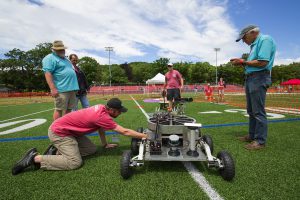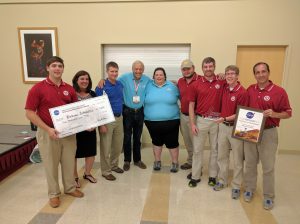
TUSCALOOSA, Ala. — After winning one NASA robotics contest, a team of engineering and computer science students from The University of Alabama successfully completed the first leg of another high-profile NASA robotics contest.
Alabama Astrobotics completed Level 1 of the Sample Return Robot Challenge, part of NASA’s Centennial Challenges prize program. The team won $6,000 and will compete in Level 2 in September for a shot at a share of a nearly $1.5 million prize.
“We entered this competition with modest goals knowing that there would be many challenges and unknowns to overcome that are part of entering a competition for the first time,” said Caleb Leslie, who joined the team as an undergraduate but is now a graduate student in electrical and computer engineering and serves as team lead for Alabama Astrobotics. “Our group has handled those challenges exceptionally well with their hard work and dedication.”
The latest success came less than a month after the team took the top prize for the second straight year, and third overall, at the NASA Robotic Mining Competition. There, the team collected $10,000 in prize money to be used for future robotics work and contests.
“The secret to success is our students. They work hard. They are talented. They are dedicated,” said Dr. Kenneth Ricks, UA associate professor of electrical and computer engineering and team adviser. “It is important to them, and they get support from the University in many forms.”
The objective of the challenge is to encourage innovations in autonomous navigation and robotics technologies. Teams must design robots that can autonomously locate, collect and return samples to the starting point. For Level 1, each robot had to return two known samples within 30 minutes without human control or the aid of Earth-based technologies, such as GPS.
Only five of the 18 teams of citizen inventors, from universities to families to small businesses, who competed in the challenge this year advanced to Level 2. It will take place Sept. 2-5.
Each winning team was awarded $5,000 for its success, and Alabama Astrobotics won the Technology Achievement Award that resulted in another $1,000 for passing a tech inspection
Also, Alabama Astrobotics is the first team in the five-year history of the challenge to successfully advance to Level 2 on its first try. The team’s robot also completed the challenge the fastest, clocking in at 6 minutes and 15 seconds. In all, only seven teams, including UA’s team, have ever advanced to Level 2.

This stage was a precursor to the more difficult requirements teams will face in Level 2, where they must locate up to 10 unknown samples that vary in size, shape and difficulty. The samples are classified as easy, intermediate and hard and are assigned corresponding point values.
“Being the first team to complete Level 1 in their first year in the competition is very rewarding, and it is an achievement we take pride in,” Leslie said. “However, succeeding in Level 1 means no rest for the weary as competing in Level 2 opens up an entirely new set of challenges that we are eager to tackle.”
Centennial Challenges, managed by the agency’s Marshall Space Flight Center in Huntsville, is NASA’s citizen inventor prize program that invites the nation to help advance the technologies that will enable travel to Mars and beyond, as well as improve life on Earth.
Worcester Polytechnic Institute hosted the event for the fifth year June 7-11 at its Worcester, Massachusetts, campus, where Level 2 will also be held.
Alabama Astrobotics is made up of about 40 students from UA and Shelton State Community College and is advised by Ricks and Renea Randle, mathematics instructor at Shelton State.
The team received funding from the Alabama Space Grant Consortium, NASA, Dynetics, Fitz-Thors Engineering, the UA College of Engineering, and the UA Student Government Association.
Contact
Adam Jones, engineering public relations, 205/348-6444, acjones12@eng.ua.edu
